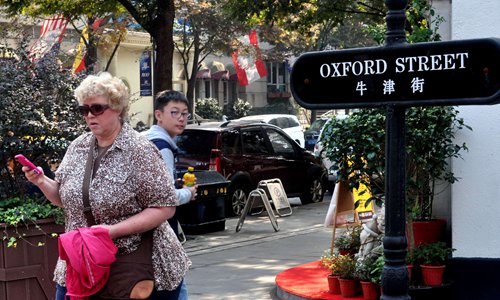HOME >> OPINION
Realty bites: What’s in a name? Well, a lot
By Rong Xiaoqing Source:Global Times Published: 2019/7/4 21:23:41

Photo: IC
I went to China recently, and caught up with the ongoing campaign against properties with foreign names initiated by local governments in many provinces and the ridicule it has drawn from netizens.
The campaign started in Hainan Province in early June when the provincial government announced a list of a few dozen properties with what it said were "improper" names, including Western labels such as Vienna, Baroque and Victoria. It demanded the owners change them because they were "kowtowing to foreign cultures."
Other provinces quickly followed. But some entities fought back by emphasizing their names were approved by authorities when they registered, and the whole thing has become a butt of jokes. One netizen commented sarcastically: "Suddenly found the neighborhood I live in is 'kowtowing to foreign cultures.'"
Looking at the ubiquitous restaurants, apartment complexes and hotels in different Chinese cities with names like "Hawaii cold noodles," "Venice Garden" and "White House," it's not hard to understand why such a seemingly frivolous matter caused a hullabaloo. Not that I haven't seen a neighborhood in the middle of nowhere in a rural area in Costa Rica called Las Vegas or a bar in Patong, Thailand, called New York. But among the bigger and more developed countries I have visited, China may have more properties named after foreign localities or landmarks.
For the private entities, the naming may only be a business consideration. The exotic atmosphere implied by foreign names helps the properties stand out in the competition and adds an additional layer of appeal as realtors pitch to potential customers. And their Chinese customers may share the same ethos as the white yuppies who have been increasingly moving into the New York Chinatown in the past few years are merely looking for something different in an otherwise familiar environment rather than really wanting to wallow in a foreign culture.
But zooming out to the broader world, naming in many cases is not a simple matter. In a world that has been and is still full of inequities and power play, naming, be it after geographic locations or people, inevitably interacts with much more complicated backdrops, such as colonialism and liberation, oppression and resistance, cultural superiority and inferiority and racism and rights. India, which gained independence from its British colonial masters in 1947, has in the past 25 years been renaming many of its cities from a British spelling to an Indian English spelling. So Bombay became Mumbai and Bangalore changed to Bengaluru.
Berlin replaced the names of imperialists on street signboards in its African Quarter with names of liberation heroes last year to show condemnation of the atrocities German colonialists committed in Africa in the past.
And when Chinese investment company Fosun International purchased the Chase Manhattan Plaza, a flagship building in downtown Manhattan, a few years ago, it renamed the property 28 Liberty Street. Fosun avoided relabeling it with a Chinese name to avoid unnerving Americans who consider the structure a landmark.
Human names are no less sensitive. Japan has recently asked international English language media outlets to write its Prime Minister's name as Abe Shinzo, and not in the Western way of putting the family name last as they do it now, a clear attempt to protect cultural symbolism.
In the US, Washington Redskins, the American football team, has been under increasing pressure to change its name which many native Americans feel is offensive amid the rising rights awareness among minorities. And if you see a Chinese American with a last name that is Western in nature and spelling, don't poke around too much. You may bring out a family's heartbreaking history when many Chinese immigrants, under the restraints imposed by the notorious Chinese Exclusion Act, had to "buy papers" from American citizens and claim to be their immediate kin in order to be allowed to get into the US.
All these sensitivities and insensitivities about naming culminated in the late night comedian Trevor Noah's acclaimed 2016 autobiography, Born a Crime, in which Noah recalled an incident in his youth in his home country South Africa when he dj-ed with a dance group whose leading dancer was a local black boy named Hitler. The name caused a massive controversy when the troupe was invited to perform at a Jewish school.
And the reason for that scandalous name? In the colonial and apartheid era, black people in South Africa were required to have an English name for the convenience of white people. And they picked up the ones that they heard of without really understanding the connotations.
To be clear, I don't support the Chinese local governments' attempts at arbitrary correction. To me, it is a wrong solution targeting the right problem, and may have a boomerang effect that would distract people from understanding the real issue. But at the same time, Chinese people may need to learn more about naming battles in other countries to be able to see global names they pick up in the correct historical context.
The author is a New York-based journalist and Alicia Patterson fellow. rong_xiaoqing@hotmail.com
Posted in: VIEWPOINT